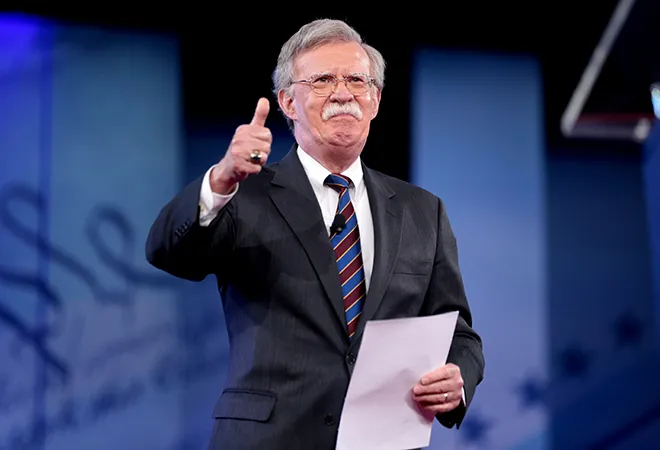
The recent terror attack in Pulwama, organised by the Pakistan-based Jaish-e-Muhammad (JeM), which have left over 40 CRPF personnel killed and over 35 wounded, once again bought to front and centre Pakistan’s complicity in sheltering terror organisations. The attack’s severity, being the worst of its kind in Kashmir, and its addition to India’s long-standing fight against cross-border terror, spurred international support for India.
On behalf of the United States, National Security Advisor John Bolton was reported to have spoken to his counterpart in New Delhi twice. Offering condolences, Bolton expressed support for India’s “right to self-defence against cross-border terrorism” and offered assistance in removing “all obstacles” to designate JeM leader Masood Azhar as “a global terrorist under the UN Security Council Resolution 1267 Committee process.”
Certainly, the response was strong in terms of calling out Pakistan. In the past, US administrations have dispatched high-level officials to urge restraint and de-escalation.
A case in point being, Deputy Secretary of State Richard Armitage’s shuttle diplomacy between New Delhi and Islamabad after the attacks on the Indian Parliament. In contrast, Bolton extended, as some commentators view it, a free hand, which “allows New Delhi to fashion its answer to the Pakistani provocation.”
However, a case could be made that the same signifies little more than mere bluster under Bolton’s overtly centralised US National Security Council setup.
In continuing the Clinton era precedent, cross-border attacks on India had led to a mobilisation of the US national security apparatus to pursue de-escalation measures or monitor possible escalations at the very least. For instance, although the 2008 Mumbai attacks coincided with Thanksgiving break, the Bush national security apparatus convened conversations remotely and ultimately cut short their breaks to reconvene in Washington a few days later. The Bush NSC put together an inter-agency plan to undercut misinformation –– and by that extension miscalculation, with “a three-way flow of information among Washington, Islamabad and New Delhi.”
As the National Security Advisor, Bolton supervises the National Security Council and hones the power to convene a principals’ committee meeting of cabinet chiefs to advise the US President on analyses, responses, and policy options. At first, it did seem as if Bolton was bringing in an inter-agency response to Pulwama, when it was reported that he rewrote an initial State Department statement on the attack that did not directly call out Pakistan. However, Bolton has been known to have reduced the frequency of such meetings to an extent that cabinet chiefs have felt “shut out of policy process”. Hence, it is no surprise that in the follow-up to Pulwama, no such meeting of principals or even their deputies was reportedly convened.
On Bolton promising cooperation over sanctioning the JeM leader at the United Nations Security Council (UNSC), one cannot help but wonder his seriousness, given his reputation of repeatedly questioning the UN’s efficacy (“The Secretariat building in New York has 38 stories. If it lost 10 stories, it wouldn’t make a bit of difference.”). Most importantly, US representation at the UN continues to be in a limbo since Ambassador Nikki Haley’s departure last year. Last week, it was reported that President Donald Trump's pick for Haley’s successor as the US ambassador to the UN, Heather Nauert, has withdrawn her nomination.
In addition, three ongoing developments are sure to further dampen any American response in support of India in the near term.
Afghan angle
Many rightly argue that Pakistan’s centrality in the ongoing Afghanistan peace process might pose challenges for the US support to India on Pulwama. This assessment holds additional credence, given the Islamabad’s role as host for the upcoming talks between the Taliban and US officials. However, it was recently reported that the Islamabad round of talks have been cancelled in view of “most members” of the Taliban negotiations team being “unable to travel due to the US and UN blacklist”. The talks will now be held once again in Doha on 25 February.
Although this may signify a reduction in Pakistani control over the process, it hardly undercuts Islamabad’s influence in a post-conflict Afghanistan.
Earlier this month, US envoy Zalmay Khalilzad, who is leading the American end of negotiations, credited Pakistan for “helping push the Taliban to the negotiating table” and intended to “improve” US relations with Pakistan.
In the days to come, once the US and Taliban iron out the hurdles in their “draft framework”, Pakistan will be highly critical in operationalising the intended withdrawal of 14,000 US troops from Afghanistan. More importantly, if the US and Taliban do come to an agreement over the Americans sustaining their airbases in Bagram and Shorabak astride Pakistan’s western border, security and intelligence cooperation between the US and Pakistan will gain a shot in the arm.
Trade negotiations
Despite honing a trade imbalance of only about $30 billion and standing tenth in the list of countries that the US registers a deficit with, India has not escaped Trump’s ire over his desire to acquire “fair” and “reciprocal” trade relations. India was hit by the US steel and aluminum tariffs last year, against which New Delhi announced its own tariffs on goods worth $240 million but held its imposition due to ongoing talks.
Nearly two years on, reports suggest trade talks continue to be at a stalemate, with the US contemplating further action. The Trump administration is now “preparing to tighten the screws” by considering to remove India from the Generalized System of Preferences (GSP) programme. The GSP allows India to “export goods such as jewelry, vehicle parts and electric motors worth $5.6 billion free of US tariffs”.
Given President Trump’s inclination to often link US defence commitments and partner nations’ security dependencies with trade imbalances and immigration issues, the ongoing Indo-US trade negotiations will surely be a matter of priority over Pulwama.
Executive overreach
The Trump administration is at war -- not with an international adversary, but at home. Although it narrowly avoided another government shutdown recently, the Trump administration has spurred yet another constitutional crisis. In continuing his insistence on securing funds for a border wall, President Trump recently declared a National Emergency, putting him on a war-footing with the US Congress and eventually with the courts, where his declaration is sure to be challenged.
There is already considerable pressure on the Republican-led Senate to check Trump’s Executive overreach by joining the Democrat-controlled House of Representatives to pass, with a veto-overriding majority, a joint resolution terminating Trump’s National Emergency. Some are even asking if the way forward is to amend existing laws to restrict Executive leeway over declaring National Emergencies without Congressional approval.
Given the serious precedents such a tussle between the legislature and the executive can lead to, in the days ahead, the Trump administration is going to have limited room in dealing with foreign policy crisis abroad.
Much less India, which in the US foreign and security policy circles isn't seen a “problem child” relative to say, Iran or North Korea. More importantly, if the Senate does rebuke Trump on his emergency, the Trump administration will have considerably less capital with the Hill. Hence, positions of immense consequence to the Indo-US dynamic like the Assistant Secretary of State for South and Central Asian Affairs may continue to remain without official confirmations.
In summation, the American response on the Pulwama terror attack packs a punch with regards to calling out Pakistan and extending support for India’s efforts to sanction Masood Azhar at the UNSC level. However, Bolton’s overtly centralised NSC processes and US representation at the UN being in a limbo pose questions over the seriousness of the US’s support.
Further dampening any American response in the near term are considerations over Pakistan’s central role in a post-conflict Afghanistan, trade negotiations with India being at a critical juncture, and the Trump administration being on a war-footing with the American legislature and judiciary over its declaration of a National Emergency.
The views expressed above belong to the author(s). ORF research and analyses now available on Telegram! Click here to access our curated content — blogs, longforms and interviews.




 PREV
PREV


